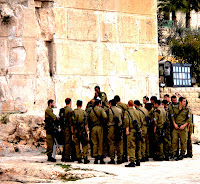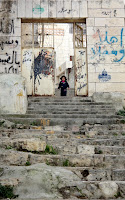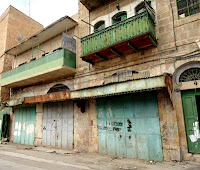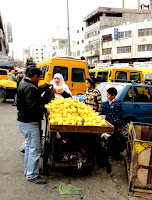
"Hebron" was my childhood school in India, named after the holy place where Abraham bought land to bury his beloved Sarah. Like Sarah's later life, it was marked by laughter and childhood chatter, birdsong in treetops (with monkeys throwing tree tomatoes at us!), sunshine and happy learning. I remember the Hebron bells ringing for recess; the playground with the log swing, giant strider, netball courts, games of marbles; the faithful teachers, daily tuck time, afternoon sung prayers, inter-school sports, plays and musicals, and kids darting everywhere!
 |
| Patriarchs buried under here |
So when we were to take a day trip to Hebron the original, where now Abraham along with Sarah, and their descendents Isaac, Rebecca, Jacob and Leah are buried, I looked forward to it!
Then I went to a talk where a former
Israeli soldier spoke.What he told us about the city of Hebron in Palestine today was horrible to hear.
 |
| Soldiers on duty cluster in Hebron |
Hebron is not a jolly place of echoing laughter. Today, Hebron stifles
tears of terror, cries of fear, wounds from kicks, scuffles, torment and
torture; random, rough midnight routings; the anguish of the vanquished. Hebron
has had the worst of the oppression in this land. It's seen terrible
violence on both Arabs and Jews, with lasting retribution being heaped, we heard, on the Arabs.
 |
| Checkpoint before entering holy site |
This Israeli ex-soldier told our group of
ex-pat women from around the world that, after his time stationed in Hebron, he found he couldn't sleep. He couldn't settle down. He
could only remember the atrocities of the intifada, crimes committed by law-enforcers, maddening memories that
he should silence but needed to speak.
And so he started to speak, telling the horrors that ordinary people didn't want to know about,
but which he blames them for as much as himself. After all, what is a soldier
but a representative of his taxpayers and government? Other Israeli
soldiers, formerly stationed in Hebron, agreed. "I couldn't question anything while I was on duty. Now I will speak: the
way we treated the Palestinians was not right." They formed a community
with the name and mission of "Breaking the Silence." Ever
since, their government has been trying to silence these silence-breakers.
(When you have time, read this link to one person's Hebron visit with them: http://www.pij.org/details.php?blog=1&id=26.)
 |
| Child behind walls |
 |
| Israeli flag in Hebron |
Let me go back for a bit of history. The intifada (meaning
"uprising, awakening, shaking off") is the name for two major rebellions when Palestinians fought to regain their land which Israel had claimed in its "creeping process of annexation"
(as described by an Israeli Minister of Economics & Finance - i.e. Israel gradually taking over Palestinian land). These uprisings took place in 1987 and 2000, with ongoing military repercussions for each.
To ensure dominance, Israel practiced an "Iron Fist" policy. This resulted, for example, in well over 23,000 children (from all over Palestine) requiring medical treatment for their beating
injuries in the first two years of the first intifada
(statistic from Save the Children). The second intifada led to the checkpoints and walls I showed in an
earlier blog. Both uprisings saw casualties and violence toward both Israelis and Arabs, but with Israel's power to hold a standing army, far more squashing came from their side. Unspeakable, sleep-depriving acts were the army's ongoing, unrelenting response, to demolish
and demean their target. At least that’s according to this ex-soldier, who
remains an orthodox Jew with a desire to share the land rather than annex it.
 |
| Abraham's grave cenotaph |
 |
| Singing his prayers |
What does Hebron look like today? We first visited the synagogue/mosque (once a church) under which the founding family is buried. Abraham is the father of all three monotheistic religions, and like almost every empire founder, tremendous division sprang up amongst his children! In the holy land this division is both political as well as religious, which means that no matter who is in power, the fight goes on. We heard a Jewish man praying in high sing-song, and listened to the call of the Muslim muezzin from a different tower. We, as Christians, were barricaded out till after prayers.
 |
| Shops sealed shut; homes barricaded |

From the shared holy site we walked into the streets of Hebron's city centre. What did we find? Nothing but silence. Thick silence. Not the silence of the watchful but the silence of the lost, disinherited, deceased. We walked, as if in a funeral, through street after street after silent street. Shops were boarded up. Apartments above them looked empty. Israeli flags fluttered in limp triumph. Nothing would open again. It was an endless, still silence, with not even a cat in sight.
 |
| Canadian volunteer |

We saw one small group of children at the end of a distant street. The front entrances to their homes have been sealed shut but they have to travel the street to get to side entrances. They were being escorted home from school by international volunteers who perform this task morning and afternoon. One volunteer we spoke to was from Hamilton, ON. It is dangerous, even now, years after the intifada, for Palestinian children to walk to their shut-off homes, for fear of Jewish settlers hurling stones at them. Stoning still happens, especially by kids who can't be charged, in Hebron, these thousands of years after Bible times.

The silence was oppressive. I mean, this is the Middle East!
When you picture it you imagine crowds bustling in bazaars, people haggling over meat and merchandise, children chasing each other through carts, clatter, clutter, clamour, chaos. (Say that fast!) None of that exists in the streets leading from the
synagogue/mosque to the heart of Hebron.

Why the silence and empty streets?
 |
| Ultra-orthodox Jews |
We were told it's because the Israeli government deems it safer for the 200 Jewish settlers in the community to walk through empty streets than through Palestinian neighbourhoods as they go to the synagogue. Therefore the Palestinian neighbourhood which existed there for generations, supporting thousands of families, 2000 shops and dozens of communities, has been barred - metal seals welded over doors. No-one has moved in besides a few settlers, so you notice your thudding footsteps as you walk. There is no access to these streets unless you are a Jew or a tourist, or happen to be a remnant Palestinian living tucked away, unseen - needing to maneuver the streets, on foot, to school.
 |
| Opening bags at the checkpoint |
The surreal silence lasts till you reach a checkpoint in a street corner. I saw a
woman at the end of the empty street, harrassed and harangued as she tried to get through the checkpoint. Then we followed her.
 |
| Tiny passage past the checkpoint |
 |
| Finally - supper shopping! |
|
|

On the other side, the vivacity you'd expect in the East suddenly burst to life! It was like stepping out of a painting into reality!
Bread bakes, kebabs sizzle, lemons and eggs and vegetables and shoes
and hookahs and fabric all call out intoxicatingly, colourfully,
cheerfully. There's hustle and bustle. People smile and laugh and shop and talk. Families buy
candy. Oh, so this is Hebron!


 |
| Old friends |
 |
| The kebab man - they smelled good! |
 |
| Better cook it quick! |
You'd hardly imagine that one checkpoint away lies a disenfranchised, deserted
community. Unfortunately, reality includes both sides. That's the grown-up truth.
Which took me back to my childhood. What changes a place even when the name's the same? After Hebron elementary school where I attended as a day scholar, Hebron high school, in a different town, felt radically different to me. Instead of the daily back and forth from home to school with clatter and chatter and tea and talk, faith and family, hugs and "how was your day?", I moved into the dorm when I was eleven. Many people liked it, and there was fun and freedom in lots of aspects. But I felt as though the heart of my life was snuffed out and I was silenced.
As I walked through Hebron here, the silence descended on me again, only
this one has no holidays or graduation in sight.
The funny thing is, the name "Hebron" means "friend, colleague, unite, to be noisy"! The significance of names is never lost. And as some brave
ex-soldiers valiantly try to break the silence here, perhaps one day Hebron will live up to its name again. I think Father Abraham, "God's friend," would be glad.



















































